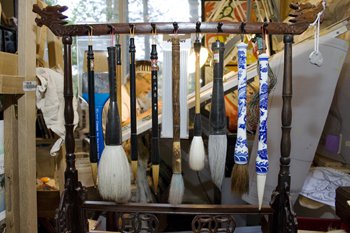
"Lost Memories" won a silver award at the 2007 National Magazine Awards.
Only loved ones remember what an Alzheimer’s patient has lost. Yoshikazu Ehara is my grandfather. Eight years ago, when he was eighty, he was diagnosed with Alzheimer’s disease. Daily life has become a struggle for Yoshikazu and his family as the disease has slowly erased his memories and abilities. This is the story of my grandfather’s struggle with the disease and his changing relationship with my grandmother, his wife Sakae.
Yoshikazu often stops near the front door to converse with a doll for long enough that a family member can catch up with him and accompany him when he goes outside.
In the evenings, Sakae waits for Yoshikazu to fall asleep before she does so herself.
In the advanced stages of Alzheimer’s, easy tasks can become difficult. Sometimes Yoshikazu tries to put on pants as though they were a shirt.
Yoshikazu has trouble sleeping at night and rests sporadically during the day. He takes a nap in the morning while Sakae waits for a caregiver to arrive from the nursing home.
I have to go,” says Yoshikazu when he wants to leave. Nobody knows why or where he wants to go.








